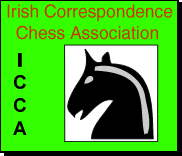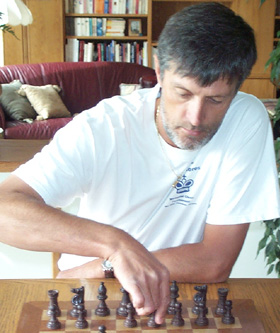 Interview
with CC-IM Dr Eugene Gibney
Interview
with CC-IM Dr Eugene Gibney
 Back
to the ICCA home page
Back
to the ICCA home page
 When
did you learn to play chess?
When
did you learn to play chess?
I learned the moves when I was about 10 or 12 years old, but only started to take the game anyway seriously in 1972 (inspired as so many of my generation by certain events in Iceland) when I was 16 years old.
When did you start playing CC?
I started playing CC in 1973, joining the British CC Association, and in 1974 began playing in the Junior sections of the Evening Herald's Irish Championship run by Jim Corby.
How strong are you OTB?
My current Canadian OTB rating is 2239, based on about 40 OTB games I've played here in the past 8 or 9 years (prior to 1993 1 played no OTB chess for about 10 years). In 1997 1 was co-winner of the Canadian Amateur Championship (OTB: for players rated 2200 or less), and I won a nice trophy for 1st Under-2000 at the 1999 Canadian Open. I do not intend to play much OTB in the future, as I know I would have to spend an extraordinary amount of time for study and training to improve my present OTB performance level, and I'm not really prepared to do this.
What do you like most about CC?
I just love the game. I enjoy the idea of trying to assess one's performance all the time, aiming to improve, and the means to measure one's progress (or lack of it). Although I lead a very busy life with work and a young family, I like to be always active, and my CC game load is my 'fix' at the end of a busy day or few days. I am a chess fanatic I read a lot about the game, but I enjoy more the personalities, the stories, etc. than just playing through games. I get withdrawal symptoms if I have no current CC game where I have the move. In my postal days I was playing 50-70 games at a time, and now with e-mail I am playing around 20.
What do you dislike most about CC?
The silent withdrawal! (In what other sport does your opponent disappear in mid-game?). For example, my final game in MN67 was against an opponent from Yugoslavia against whom I needed a draw to clinch my final IM norm. Early on, the game (played by snail-mail) was interrupted by the Balkan conflict. After it resumed I achieved a winning position when my opponent went silent, necessitating the registered letters, communications to the TD etc. At least when playing by e-mail, dealing with this situation is much simpler and speedier. (Have you ever noticed how really impatient CC players are when it comes to matters other than the actual moves of a game? Just look at some of the postings on TCCMB and you will see what I mean. The outsider would probably expect a CC player to have the patience of Job!).
What sort of preparation did you do for MN67?
My preparation for MN67 consisted of revising about 80% of my opening repertoire, and spending a lot of time trying to improve my endgame skills! The first proved most important in MN67 as there were no endgames of a really decisive nature in the event (my endgame work did however helped me a lot in Canadian championship events).
I discarded a lot of dubious openings I had been playing (Morra-Smith gambit as white, O'Kelly Sicilian as black). I kept a record of my games in a folder with Berliner's motto ('Every move a research project") on the cover! I'm not going to pretend I succeeded in following this throughout the event, but it did help me retain a 'good attitude' towards my games.
What is your routine for making moves? For instance, when I receive a move, I do the paperwork, recording it in ECTool and on my Chessbase DB. Then 1 look at my analysis, review it, leave it for a few days, and then in a panic with time trouble approaching, make a move. No doubt, you are more disciplined.
I still use an old-fashioned file folder and game sheets to keep a record of my games (although nowadays I also have current games on a small separate database on computer). I do not have ECTool, nor do I have Chessbase. After recording my opponents move and time details etc. I nearly always spend a few minutes examining the new position that same day (a bit longer if the move is unexpected). This imprints the position in my mind, and allows me to sometimes work on it blindly during the day.
Depending on time available, my game load etc., I will then do my main work on the position sometime within 1-3 days of receiving the move. I tend to move fairly quickly through the opening moves, but in a complex middle game position I may spend an hour analysing three or four nights in succession before reaching a decision.
If I feel the position is really critical, I find it useful to take a break from it then for a few days before returning to it. I sometimes come up with interesting ideas when analysing blindly during this time (while cutting the grass, sitting in church, waiting for the lights to change).
I do quite a lot of work on positions when my opponent has the move if I have the time. I often analyse early middle game positions down to the type of endgames that may result. These deep analyses are not highly accurate, but give a good 'feel' for the possibilities in a position, and often help to distinguish between advantages which are real and lasting, from those likely to disappear (often suddenly — I'm sure you know the feeling) as the game progresses.
What type of positions do you like playing?
Winning ones! But seriously, I like to play positions where I have a small positional plus and try to squeeze the most from it, preferably down to an advantageous endgame, where really precise play is rewarded, and computer generated moves are of dubious value. As White, I try to aim for a small but persistent advantage rather than trying to blow black off the board, and as Black I try for equality before looking for an advantage. (Luckily in the Sicilian Defence, when Black equalises he already has an advantage!)
Do you use computers? How do you use them? For opening research, tactical analysis, pawn structure investigations (a la Jon Edwards), endgames?
I use computers in a number of ways. Databases are used for opening research, but one has to be very careful since there are a lot of poor quality games in the large databases available. The Chesslab online database is excellent, and by selecting rating and year criteria and using the position statistics function can provide some really useful information. This overview is then supplemented by study of relevant annotated games in recent Informators and NIC Yearbooks.
In opening research I also like to look at some lines with Fritz on infinite analysis. It is surprising how often so called solid lines have hidden tactical resources not apparent in the opening literature.
I use Fritz for tactical analysis (but largely ignore its evaluations in the opening and the endgame). I do most of my chess analysis on the Fritz board when I'm at home, and the ease of returning to the current position, or saving a line for later re-evaluation is a real time saver compared to the board-and-pieces of old.
I do not do Jon Edwards style pawn-structure evaluations, but this I think is because I too lazy to be bothered with this (and certainly not because I think I know all this stuff already!). In the endgame the computer is useful for blunder-checking, but is very limited in really proper evaluations, even in very simple positions sometimes.
After your first norm, how often did you come close to the second and final norm?
I did not come close at all to my second norm in any event until MN67. I played in MNI6 and performed very poorly, and it was this performance which led me to examine more closely my play (opening choices, amount of time spent on analysis etc) and led to the changes I made prior to commencing MN67.
What did you do differently in MN67 from the other events? Yes, I know, you won more games, but, heh, I'm looking for the secret of your success! My readers want a panacea for their chess.
Probably the two main factors were a careful re-evaluation of my choice of openings, and changes in my life outside of chess, which allowed me to spend more time on the games. (From 1993 to late 1998 I worked as a sole surgeon in a community of about 20,000 people, and was on call all the time. In 1998 a second surgeon was recruited to the community and this made a big difference to my workload and on-call schedule —which became one in two).
The use of computer generated analysis also helped, in that it shortened the time I needed to spend on tactical analysis, and made it easier to analyse, save the analysis, and return to the starting position. This allowed me more time to work on positional aspects of the games, and look deeper into the positions.
I don't have a panacea for your readers, but I think it is really important to try to recognise the types of positions one plays well and is comfortable with, and to develop a solid opening repertoire with these types of position in mind.
It is a good idea to be realistic — don't expect to blast Black off the board just because you are White — be content with a small advantage out of the opening, particularly if it is a lasting one. Don't be afraid of equal positions. Many equal positions are much easier to play for one side than for the other. Study the endgame, and your middle-game strategy will improve proportionally.
Do you prefer Postal or Email?
I prefer email now that I have adjusted to it and manage my game load better. It is more reliable, repeat moves are easier, and the absence of really long delays keeps the games fresh in my mind.
Go to the Eugene Gibney game page
 Back
to the ICCA home page
Back
to the ICCA home page
ICCA is the 32-county governing body organising
correspondence chess activities for Irish players living at home or abroad.
A non-profit-making organisation, we run the national championship, Irish
teams and other activities. We are affiliated to ICCF
and the Irish Chess Union (which controls "over-the-board" chess here).
Want to know more about correspondence chess? Visit the Chess Mail site! |